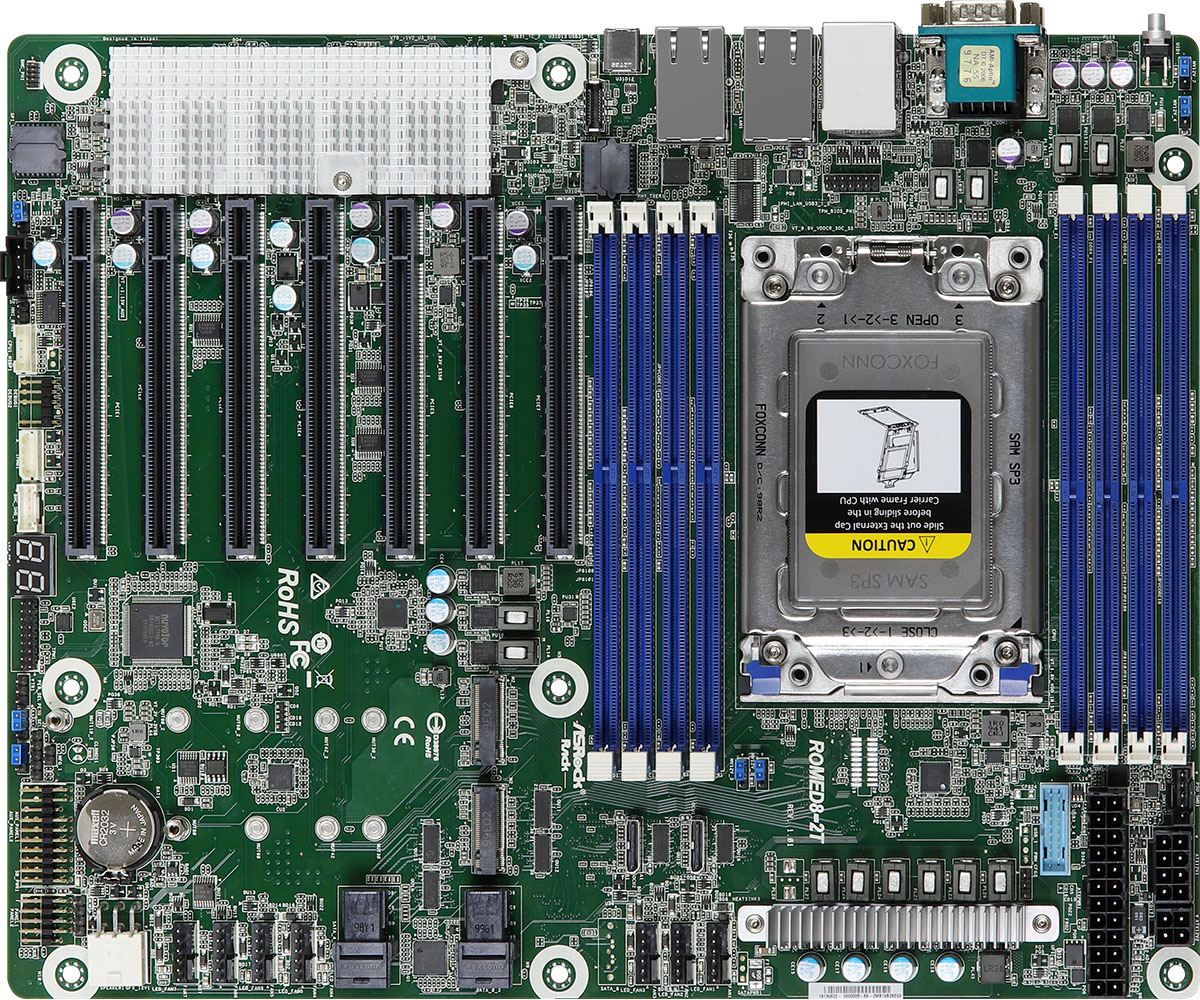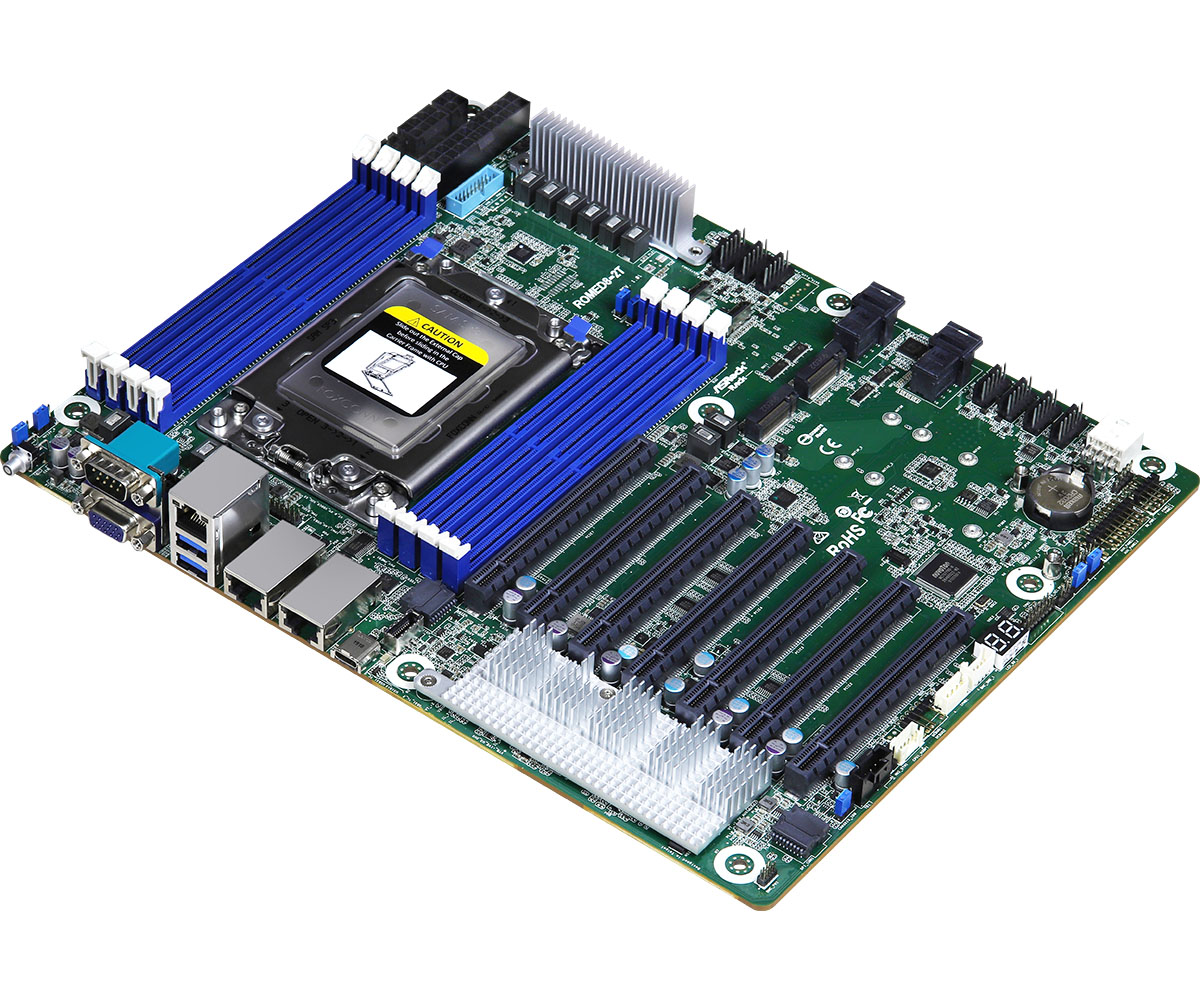ASRock's AMD EPYC Motherboard Flaunts Seven PCIe 4.0 x16 Expansion Slots

German news outlet HardwareLuxx noticed a fascinating LGA4094 motherboard for AMD's EPYC processors in ASRock Rack's arsenal. For the uninitiated, ASRock Rack is ASRock's elite server division.
ASRock Rack engineered the ROMED8-2T to house both EPYC 7001-series (Naples) and EPYC 7002-series (Rome) processors. The motherboard features the standard LGA4094 (Socket SP3) socket and adheres to the ATX form factor. The ROMED8-2T is a server product, after all, so ASRock crafted it with a green PCB and it lacks fancy heatsinks or RGB bling.
This board comes with the ultimate in connectivy: AMD's EPYC 7002-series chips deliver an impressive 128 high-speed PCIe 4.0 lanes, and ASRock Rack is keen to take advantage of them. Therefore, the ROMED8-2T is equipped with nothing less than seven PCIe 4.0 x16 lanes to exploit the latest and fastest PCIe 4.0 SSDs and enterprise graphics cards on the market right now. Only the second PCIe 4.0 x16 slot shares bandwidth with the mini-SAS, M.2 and OCuLink connectors.

The motherboard has eight DDR4 memory slots that support different formats. It's compatible with 32GB RDIMMs (Registered DIMMs), 256GB LRDIMMs (Load-Reduced DIMMs) and 32GB NVDIMMs (Non-volatile DIMMs). The official memory speed supported across all three formats is 3,200 MHz.
The ROMED8-2T boasts a very unique and advanced storage configuration. There are two mini-SAS connectors to support up to eight SATA III drives in total and one SATA DOM port. The motherboard exposes two OCuLink connectors for U.2 SSDs. It also has two M.2 PCIe 4.0 x4 ports. Although both M.2 ports support PCIe-and SATA-based SSDs, the primary port accommodates drives up to 80mm in length while the secondary port can hold SSDs up to 110mm.
In addition to the enormous amount of PCIe 4.0 x16 lanes, the ROMED8-2T also has other neat features. Intel's X550-AT2 controller provides the motherboard with two 10 Gigabit Ethernet ports while Realtek's RTL8211E controller manages the single Gigabit Ethernet port.
The ROMED8-2T incorporates Aspeed's AST2500 server management processor. The AST2500 features an 800 MHz Arm11 processor and 512MB of DDR4 memory. It's responsible for supplying the VGA port on the motherboard.
Get Tom's Hardware's best news and in-depth reviews, straight to your inbox.
The rear panel's other interfaces include one COM port, two USB 3.1 Gen 1 Type-A ports and one USB 3.1 Gen 2 Type-C port. You shouldn't have to worry though since the motherboard integrates one USB 3.1 Gen 1 header and one USB 3.1 Gen 2 header. The combination should be good for another four additional USB 3.0 ports.

Zhiye Liu is a news editor, memory reviewer, and SSD tester at Tom’s Hardware. Although he loves everything that’s hardware, he has a soft spot for CPUs, GPUs, and RAM.
-
TechLurker This is one of those things I absolutely want to have but do not need. It would make for an amazing overkill home server core.Reply -
Soul_keeper Amazing they were able to fit it into standard atx form factorReply
Yet the highend desktop ryzen boards all seem to be eatx or atx xl. -
twotwotwo ReplyTechLurker said:This is one of those things I absolutely want to have but do not need. It would make for an amazing overkill home server core.
How many IOPS? Alllll the IOPS. -
slash3 Not that anyone reads these, but the Newegg link is to the wrong model. That's the old EPYCD8-2T, not the upcoming ROMED8-2T.Reply -
Vidiot Any idea if a dual proc is coming? Been laboring over EPYC or Threadripper here lately but with PCIe 4 on the table and M.2, leaning back towards EPYC. would love a dual proc option! (I just like overspending, LOL)Reply -
bit_user Reply
Why do you need > 64 cores? Just curious.Vidiot said:Any idea if a dual proc is coming?
Supermicro makes a dual-EPYC EATX board:
https://www.supermicro.com/en/products/motherboard/H11DSi
There's also a variant with dual-10 Gigabit Ethernet and dual-NVMe:
https://www.supermicro.com/en/products/motherboard/H11DSi-NT
In a desktop enclosure, I think you'll need a custom-loop water-cooling setup for it.
If you're actually serious about this, please let us know how it goes. -
Vidiot ReplyVidiot said:Any idea if a dual proc is coming? Been laboring over EPYC or Threadripper here lately but with PCIe 4 on the table and M.2, leaning back towards EPYC. would love a dual proc option! (I just like overspending, LOL)bit_user said:Why do you need > 64 cores? Just curious.
Supermicro makes a dual-EPYC EATX board:
https://www.supermicro.com/en/products/motherboard/H11DSi
There's also a variant with dual-10 Gigabit Ethernet and dual-NVMe:
https://www.supermicro.com/en/products/motherboard/H11DSi-NT
In a desktop enclosure, I think you'll need a custom-loop water-cooling setup for it.
If you're actually serious about this, please let us know how it goes.
Thanks for the reply!
It's actually more about the PCIe 4, the number of lanes that EPYC offers is great, also the memory bandwidth and the M.2 slots like on some of the Creator MB's. As far as Threadripper goes, I was looking at the faster 3970 (32 cores). 64 is a bit over the top but I do a ton of Encoding, Transcoding, Editing, Color Correction and Rendering. 4k projects for sure and now requests for 8k. A good balance of clock speed and cores is what I'm really looking for. Thunderbolt is a big plus too. Wish EPYC had a bit faster clock speed... Sure it will soon the way AMD is pushing development. -
bit_user Reply
I'd probably stick with ThreadRipper, either 32 or 64 cores.Vidiot said:It's actually more about the PCIe 4, the number of lanes that EPYC offers is great, also the memory bandwidth and the M.2 slots like on some of the Creator MB's. As far as Threadripper goes, I was looking at the faster 3970 (32 cores).
There are PCIe cards that can give you Thunderbolt ports, as you probably know.
AMD released a higher-clocked EPYC model, intended for water-cooled chassis, which seemed aimed at supercomputers. I don't know how accessible it is, but maybe you can get one through a custom workstation vendor.Vidiot said:Wish EPYC had a bit faster clock speed... Sure it will soon the way AMD is pushing development.
Anyway, here are two I found:
https://bizon-tech.com/amd-epyc-7000-series-up-to-128-cores-workstation-pc(single- & dual- CPU)https://www.velocitymicro.com/wizard.php?iid=337 (single-CPU)https://www.velocitymicro.com/promagix-hd360a-epyc-workstation-pc.php (dual-CPU) -
bit_user Ah, here's the supercomputer-grade EPYC model, with the 280 W TDP. Turbo is still kinda low.Reply
https://www.tomshardware.com/news/amd-epyc-7h12-dell-emc-supermicro-atos-tsmc-server-launch,40427.html